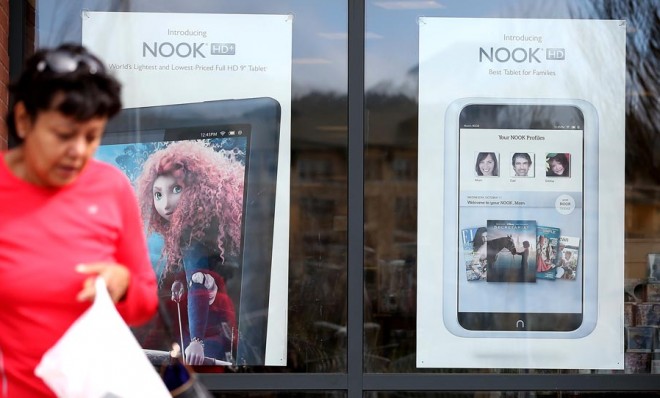Why Microsoft's Nook bid makes sense
One word: Content

A free daily email with the biggest news stories of the day – and the best features from TheWeek.com
You are now subscribed
Your newsletter sign-up was successful
A fresh batch of leaked internal documents suggests that Microsoft is considering a $1 billion buyout of Nook Media LLC, the tablet division of Barnes & Noble. Wall Street seems to like the idea, too: Barnes & Noble shares shot up 25 percent after the news broke.
TechCrunch reports that the proposal includes Nook e-readers and tablets, as well as the company's e-book business. TechCrunch says documents also indicate that "Nook media plans to discontinue its Android-based tablet business by the end of its 2014 fiscal year," while still distributing content through third-party devices, which we'll assume includes Microsoft's Surface.
Although reviews have been largely positive, the Nook has struggled to compete with Amazon's unique ability to undercut the competition with fire-sale prices — hence the Kindle's 55 percent slice of the e-book market. Back in February, rumors began floating that Barnes & Noble was looking to spin off its Nook division entirely after a disappointing holiday season.
The Week
Escape your echo chamber. Get the facts behind the news, plus analysis from multiple perspectives.

Sign up for The Week's Free Newsletters
From our morning news briefing to a weekly Good News Newsletter, get the best of The Week delivered directly to your inbox.
From our morning news briefing to a weekly Good News Newsletter, get the best of The Week delivered directly to your inbox.
Some critics aren't too keen on the Nook's apparent decision to leave the hardware game. "Without a dedicated device, why will readers buy e-books from Nook rather than Amazon or Apple?" wonders Jeremy Greenfield at Forbes:
Unless something changes drastically, it won't be user experience (Amazon leads in that category). It won't be because of price (Amazon and sometimes Apple are often the leaders here). It won't be exclusive content (Amazon, Apple, and Zola are the most aggressive here). And it won't be because of loyalty to Barnes & Noble since Nook will no longer be associated with that brand. [Forbes]
On the other hand, the proposal makes sense for Microsoft, which is looking to bolster its growing content archive. "Selling books is definitely a service," says Ian Paul at PC World:
Microsoft is no stranger to peddling content, with Xbox Music and Xbox Video already available on Windows 8 and the Xbox 360. Millions of people are already invested in the Nook ecosystem. [PC World]
What else is in it for Microsoft, which already invested $300 million in the Nook enterprise back in April 2012?
Well, adding 3 million e-books to its collection of movies and TV shows certainly makes the Windows ecosystem more attractive to gadget-buyers — which is key if it wants to compete with Amazon and Apple in the mobile arena. If consumers tailor their digital media to their new Windows Phone 8, for example, they're more likely to purchase a Windows Phone again in the future.
A free daily email with the biggest news stories of the day – and the best features from TheWeek.com
And remember: Digital content is cheap. All you have to do is host and sell it. Hardware, on the other hand, is expensive: You need to develop it, manufacture it, store it somewhere, convince people it's worth buying, and then improve it... Every. Single. Year.
In that respect, the Nook failed admirably. As a book retailer that's been around since 1917, perhaps Barnes & Noble was never equipped to compete with tech companies like Amazon and Apple in the first place — but Microsoft can.
-
 5 cinematic cartoons about Bezos betting big on 'Melania'
5 cinematic cartoons about Bezos betting big on 'Melania'Cartoons Artists take on a girlboss, a fetching newspaper, and more
-
 The fall of the generals: China’s military purge
The fall of the generals: China’s military purgeIn the Spotlight Xi Jinping’s extraordinary removal of senior general proves that no-one is safe from anti-corruption drive that has investigated millions
-
 Why the Gorton and Denton by-election is a ‘Frankenstein’s monster’
Why the Gorton and Denton by-election is a ‘Frankenstein’s monster’Talking Point Reform and the Greens have the Labour seat in their sights, but the constituency’s complex demographics make messaging tricky